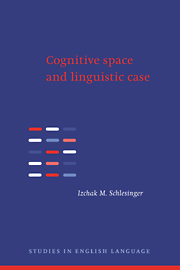7 - Mental verbs
Published online by Cambridge University Press: 20 October 2009
Summary
In the preceding chapters we saw that the subject of a sentence may be either in the A-case (the extended agent) or in the Attributee case. This chapter deals with subjects of mental verbs (sometimes called psychological verbs). It will be shown that no additional case category needs to be introduced for sentences with mental verbs; rather, these can be accommodated by the cases discussed in previous chapters.
Experiencer and Stimulus – the problem
In English there are two types of sentence structure in which a mental verb may appear. There are sentences where the subject refers to the Stimulus of the experience (sometimes called the Theme, but here we will use the former term). In the other kind of sentence the subject is the Experiencer. These two types are illustrated in Table 7.1. (For the sake of clarity, Experiencers will usually be given names beginning with an E, while names beginning with st will designate the Stimulus.)
Table 7.1 introduces some terms it will be convenient to use: A distinction is made between S-sentences, in which the subject is the Stimulus, and E-sentences, in which it is the Experiencer. The mental verb in an S-sentence will be called S-verb, and the verb in an E-sentence will be called E-verb. S-verbs include: fascinate, irritate, annoy, bore, and thrill. E-verbs include: respect, like, hate, admire, and detest.
That either the Stimulus or the Experiencer may be the subject poses a problem for any subject selection hierarchy.
- Type
- Chapter
- Information
- Cognitive Space and Linguistic CaseSemantic and Syntactic Categories in English, pp. 139 - 162Publisher: Cambridge University PressPrint publication year: 1995

